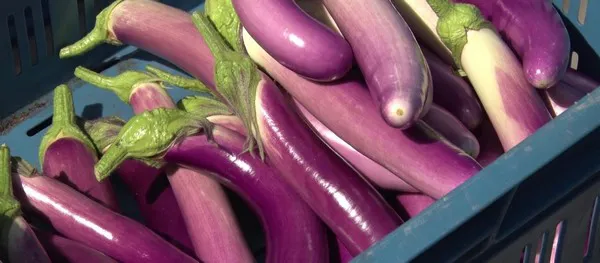Eggplant growers are in the best period of the year. “At this time of the year, from the end of August to mid-October, we have to earn our money. That happens every year,” says Dutch eggplant grower Ted Van Luijk.
The price for eggplants showed a strong increase on the Belgian clock and last week went to 1.30 per kilo compared to 80 cents a week earlier. Van Luijk is not surprised by this. “The price goes up every year during this period. Due to the warm months, the Spanish supply comes to an end, so there are far fewer eggplants on the market. As a result, prices go up considerably. This is the most important period for Dutch growers. Now the money has to be earned. Until July it is important to break even.”
Spanish competition determines price
Spanish competition normally resumes in October after growers implement a crop rotation in September. Van Luijk only plants his crop rotation in November, after which he will have production again in February. Spring is traditionally a bad period when competition from Spain is pushing down prices and production costs are higher.
This year this was twice as bad due to the coronavirus. At the end of May, the eggplant grower was even less optimistic. Due to the coronavirus, the closure of the restaurant industry and decline of exports, the grower's sales were dramatic and large batches were destroyed. Van Luijk and his son Dennis grow eggplants on three hectares, half of which are specialties. For these products he is dependent on the restaurant industry.

Image from local television feature in the middle of the corona crisis
With the scaling back of the coronavirus measures and the opening of the restaurant industry, the demand for specialties increased. “Now we have to wait for the restart of exports to countries such as the US, Canada and the UAE. These are traditionally important customers,” he says.
Coronavirus has no influence on cultivation plan
He emphasizes that there really is a difference with specialties. "There is no interest in white and green fingers, while the black and purple fingers in contrast do very well."
It is this trend that will determine his cultivation plan for the coming year, not the possible closure of the restaurant industry. After all, this risk is real with a subsequent flare-up of coronavirus. "I remain positive and assume that a vaccine will be available soon, which will allow us to return to the normal situation."
The current flare-up of the coronavirus in Spain will not affect imports, according to the grower. “The import of Spanish eggplants will not stop. The growers still will have to sell their products and the price is leading the market.”
Van Luijk expects to be able to compensate the coronavirus losses this year. “This is also because we received better prices than usual in June and July. Sometimes prices are then only 30 cents per kilo, but this year it was 40 to 50 cents,” says the grower.
The explanation according to him? “This year people stayed at home more during the holidays and spent more time on food. There may also have been more barbecuing.”
For more information:
Kwekerij van Luijk
www.aubergines.info
